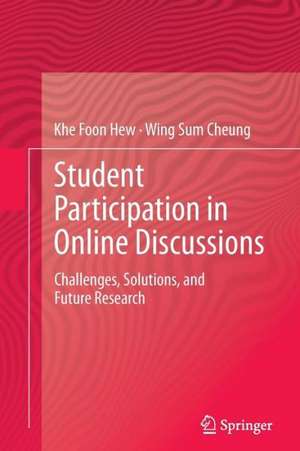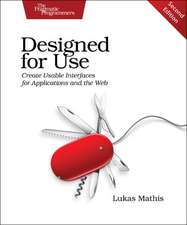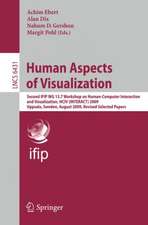Student Participation in Online Discussions: Challenges, Solutions, and Future Research
Autor Khe Foon Hew, Wing Sum Cheungen Limba Engleză Paperback – 17 iul 2014
| Toate formatele și edițiile | Preț | Express |
|---|---|---|
| Paperback (1) | 633.53 lei 6-8 săpt. | |
| Springer – 17 iul 2014 | 633.53 lei 6-8 săpt. | |
| Hardback (1) | 639.73 lei 6-8 săpt. | |
| Springer – 14 iun 2012 | 639.73 lei 6-8 săpt. |
Preț: 633.53 lei
Preț vechi: 745.32 lei
-15% Nou
Puncte Express: 950
Preț estimativ în valută:
121.22€ • 126.91$ • 100.31£
121.22€ • 126.91$ • 100.31£
Carte tipărită la comandă
Livrare economică 05-19 aprilie
Preluare comenzi: 021 569.72.76
Specificații
ISBN-13: 9781489994141
ISBN-10: 1489994149
Pagini: 156
Ilustrații: XIV, 142 p.
Dimensiuni: 155 x 235 x 8 mm
Greutate: 0.23 kg
Ediția:2012
Editura: Springer
Colecția Springer
Locul publicării:New York, NY, United States
ISBN-10: 1489994149
Pagini: 156
Ilustrații: XIV, 142 p.
Dimensiuni: 155 x 235 x 8 mm
Greutate: 0.23 kg
Ediția:2012
Editura: Springer
Colecția Springer
Locul publicării:New York, NY, United States
Public țintă
ResearchCuprins
.-1 Introduction to asynchronous online discussion.-2 Literature Review.-3 Challenges: Students making few or no postings, Students exhibiting surface-level critical thinking, Students showing low-level knowledge construction.-4 Potential Solutions: Use of Grades, Use of number of posting guideline, Instructor facilitation, Student/Peer facilitation.-5 Case Studies on student facilitation: What motivates students to participate? -6 Case Studies on student facilitation: How to sustain participants' online discussions? -7 case Studies on student facilitation: How to foster high levels of knowledge construction?-8 Exploring audio based online discussion.-9 Conclusions.
Notă biografică
Dr. Cheung Wing Sum is an Associate Professor in the Learning Sciences and Technologies Academic Group at teh Nanyang Technological University, Singapore. . He is also the MAIDT Program Coordinator of LST. He was educated at Northern Illinois University where he rreceived undergraaduate degrees in Management and Computer Science, an MS in Computer Science and an EdD in Curriculum & Supervision. His research areas of interest include: Asynchronous Online Discussion, E-Learning, Instructional Design, and Multimedia Design.
Dr Khe Foon Hew earned his doctorate in Instructional Systems Technology from Indiana University, Bloomington. He is currently with the Learning Sciences and Technologies academic group at the National Institute of Education, Nanyang Technological University, Singapore. Dr. Hew's areas of research interest include: Online facilitation strategies; Student interaction & cognition in computer-supported environments; Online communities of practice; and Integrating Technologies in teaching and learning contexts.
Dr Khe Foon Hew earned his doctorate in Instructional Systems Technology from Indiana University, Bloomington. He is currently with the Learning Sciences and Technologies academic group at the National Institute of Education, Nanyang Technological University, Singapore. Dr. Hew's areas of research interest include: Online facilitation strategies; Student interaction & cognition in computer-supported environments; Online communities of practice; and Integrating Technologies in teaching and learning contexts.
Textul de pe ultima copertă
The increasingly prevalent use of online- or blended-learning in schools and universities has resulted in the asynchronous online discussion forum becoming a common means of facilitating dialogue between instructors and students, as well as between students and students, beyond the boundaries of the physical classroom.
This book provides a comprehensive review of previous research studies in order to identify the prevalent factors leading to limited student contribution in online discussion forums.
To set the research in context, nine exploratory case studies are presented and procedures to implement the solutions provided.
This book is distinctive and results-focused, unlike others tackling this topic. Using empirically-based methodologies, the book clearly and succinctly provides up-to-date infomration on a previosuly under-represented area of research. For once, the focus is squarely on student/peer facilitation rather than teacher facilitated or heavily text based discussion.
This book provides a comprehensive review of previous research studies in order to identify the prevalent factors leading to limited student contribution in online discussion forums.
To set the research in context, nine exploratory case studies are presented and procedures to implement the solutions provided.
This book is distinctive and results-focused, unlike others tackling this topic. Using empirically-based methodologies, the book clearly and succinctly provides up-to-date infomration on a previosuly under-represented area of research. For once, the focus is squarely on student/peer facilitation rather than teacher facilitated or heavily text based discussion.
Caracteristici
Provides an up-to-date and comprehensive review of more than 50 research studies on online discussions Completely dissects and analyzes nine contextualized case studies Provides concrete examples for creating a productive online learning environment Provides empirically-based guidelines to address challenges of online discussions Includes supplementary material: sn.pub/extras













